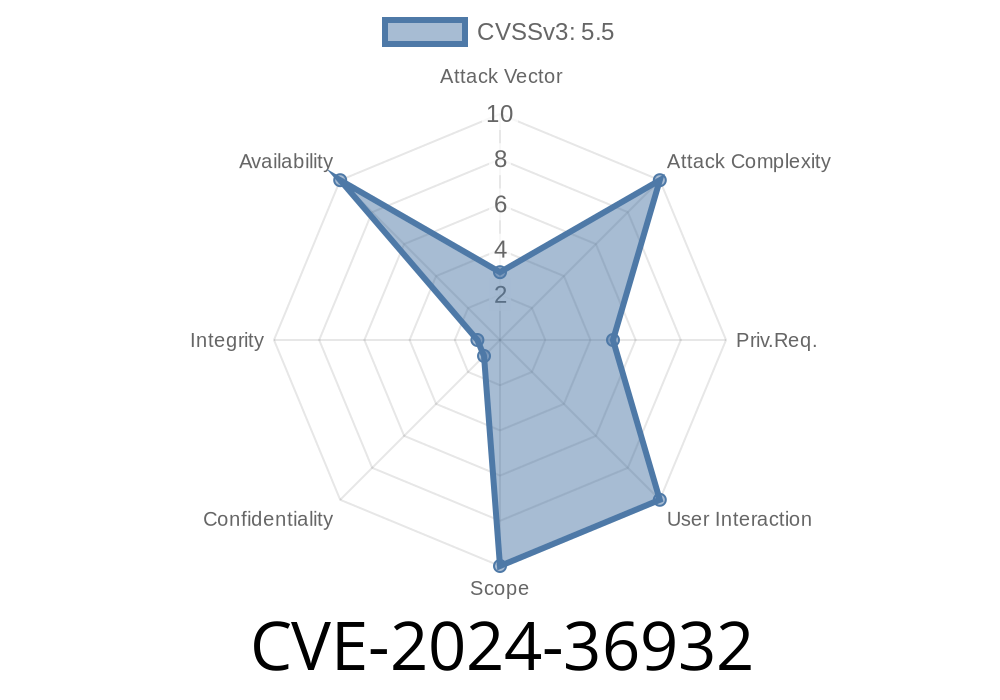The Linux kernel remains the backbone of modern computing. Security and stability are critical, and the community is quick to address issues when they arise. CVE-2024-36932 is one such vulnerability discovered in the kernel’s thermal/debugfs subsystem. If left unpatched, it could let an attacker crash or destabilize a system by triggering a *use-after-free* condition.
This post breaks down this recent vulnerability, detailing what went wrong, how it was fixed, including sample code, and what you can do to stay safe. No deep kernel background required!
What Is CVE-2024-36932?
CVE-2024-36932 impacts the Linux kernel’s thermal debug file system, specifically in code managing *cooling devices* (cdevs). The bug can trigger a *use-after-free*: a type of memory safety issue where code keeps using memory after it’s been released, potentially leading to kernel crashes, denial of service, or even code execution, depending on the context.
Where Was the Problem?
Internally, the kernel tracks cooling devices (cdevs) and allows userspace to interact with them through debugfs. When removing a cdev, the kernel calls thermal_debug_cdev_remove(). This function could run at the same time as another function, thermal_debug_cdev_state_update(), *without* proper locking.
The removal function (thermal_debug_cdev_remove) could free up the struct thermal_debugfs object, while another thread was still using it in thermal_debug_cdev_state_update(). If this happened, a stale pointer would be dereferenced — causing a crash or worse.
Here's a simplified sketch of the problem
// Somewhere in the kernel:
void thermal_debug_cdev_remove(struct thermal_cooling_device *cdev) {
struct thermal_debugfs *debugfs = cdev->debugfs;
// ... no locking ...
if (debugfs) {
kfree(debugfs); // MEMORY IS FREED HERE
cdev->debugfs = NULL;
}
}
void thermal_debug_cdev_state_update(struct thermal_cooling_device *cdev, int new_state) {
struct thermal_debugfs *debugfs = cdev->debugfs;
if (debugfs) {
// ... CRASHES IF debugfs WAS FREED IN ANOTHER THREAD ...
debugfs->state = new_state;
}
}
No lock protects cdev->debugfs between checking and using it!
How Was It Fixed?
The fix is simple but essential: add locking around accesses to cdev->debugfs in both removal *and* state update functions. That way, if one thread is freeing the debugfs object, another can’t use it at the same time.
Patch Overview (Reference)
The patch can be seen in the official repository:
https://git.kernel.org/pub/scm/linux/kernel/git/torvalds/linux.git/commit/?id=8b9f480b
Key chunk (simplified)
void thermal_debug_cdev_remove(struct thermal_cooling_device *cdev)
{
mutex_lock(&cdev->lock); // LOCK ADDED
struct thermal_debugfs *debugfs = cdev->debugfs;
if (debugfs) {
cdev->debugfs = NULL;
kfree(debugfs);
}
mutex_unlock(&cdev->lock); // LOCK RELEASED
}
Now, both functions acquiring cdev->lock means accesses are perfectly synchronized.
Possible Exploit (Walkthrough)
This bug is mostly a denial-of-service risk, since it requires kernel-thread-level races (there’s no userspace memory corrupter here). But, suppose an attacker could cause two cooling device removals *at the same time*, they might be able to trigger a crash consistently.
A demonstration (theoretical)
1. Set up: The attacker gains access to the system and finds a way to initialize two kernel threads that interact with the same cdev.
Result: Use-after-free can cause kernel panic or, in rare cases, further exploitation.
This doesn’t have a convenient userspace exploit — but on research or multi-user systems, an attacker might crash the system at will. (See Linux race conditions for how these bugs are found.)
Official reference
- Linux kernel stable mailing list
- CVE Record at Mitre *(entry may take some time to propagate)*
Conclusion
CVE-2024-36932 is a use-after-free bug in the Linux kernel’s thermal debugfs handling, affecting 6.8+. By adding appropriate locking, the bug is now fixed upstream — and you should update as soon as your distribution provides the patch.
Want to explore more? Read
- Upstream patch in kernel.org
- Thermal subsystem documentation
Stay safe, stay patched!
*This write-up is exclusive for educational purposes and helps raise awareness about rapid kernel development and the importance of security updates. Always test in a safe environment!*
Timeline
Published on: 05/30/2024 16:15:16 UTC
Last modified on: 06/10/2024 19:20:40 UTC
